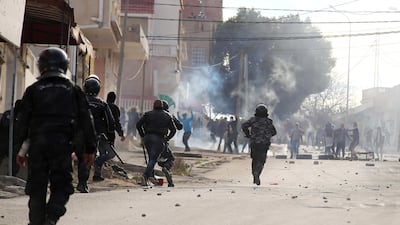After three nights of protests Tunisia awoke to an uncertain calm on Thursday as speculation mounts over how long the current wave of unrest might last and how far it might spread.
So far demonstrations have been reported at six places around the country, including the capital, Tunis. However, the focus of the protests has been the hardscrabble town of Kasserine, close to the Algerian border, where 14 people were arrested overnight as demonstrators and police traded stones for tear gas in running battles.
Protests over the country's dire economic conditions, felt most acutely in neglected interior areas such as Kasserine, broke out on Monday after Abderrazak Zorgui, a video journalist from the town, died after setting himself on fire. In a video message posted before his immolation, Zorgui spoke of the failures of the country to live up to the promises of its 2011 revolution, specifically, the failure to offer hope to Tunisians living in Kasserine and nearby areas.
There was little ambiguity over his aim. “I have decided today to put a revolution in motion,” he said.
“Whoever wishes to support me will be welcome. I am going to protest alone. I am going to set myself on fire and if at least one person gets a job thanks to me, I will be satisfied.”
A similar act by street vendor Mohammed Bouazizi in 2010 sparked the Tunisian uprising that inspired other countries across the region the following year.
Starved of opportunity, investment and repeatedly harried by the disparate gangs of terrorists that haunt the mountainous countryside, Kasserine has proven a reliable tinderbox for protest in Tunisia. Unemployment in the town runs at around 30 per cent, double the national average and eclipsing even nearby Sidi Bouzid, the site of Bouazizi’s protest.
In January 2016, protests that began in Kasserine following the accidental death of unemployed graduate Ridha Yahyaoui led to nationwide unrest and the country being placed under curfew. A series of measures announced by the government either failed to materialise or did little to address the underlying causes of the problems in Kasserine and the interior. The following year, the town was again at the forefront of nationwide protests over the government’s plans to raise taxes on basic goods.
With economic progress still stalled, there is potential for the latest unrest to spread, said Youssef Cherif, a political analyst in Tunis.
"It can develop further, but it can also die down like what happened a year ago," Mr Cherif told The National. "We are talking about the same grievances in the same regional areas … that pushed to the uprising of 2011 and several subsequent social movements."
_______________
Read more:
Sidi Bouzid's rage still simmers, 8 years after Tunisian revolution
Tunisia's state of emergency provides cover for police abuses, analysts say
Tunisia prime minister accused of coup plot and dismisses allegation as 'a joke'
_______________
As in 2011, the latest unrest is taking place amid wider international discontent, from the yellow vest or "Gilet Jaunes" protests against new taxes in France to the rising frustration among youth in much of the Middle East as economic growth fails to match the growth in their numbers.
“It can be put in the context of France's Gilets Jaunes, Sudan's cities' revolt, Jordan et cetera,” Mr Cherif said. “Everywhere youth, middle class, retired people are feeling the strains of the economy. They can't see any future and they express their anger by taking it to the streets. “
Shortly after Zorgui's death, Tunisia’s national union of journalists called for a general strike on January 14, the anniversary of the 2011 revolution. The SNJT also said that a free media was unable to flourish under conditions of “corruption, impoverishment, marginalisation and violation of the rights of journalists”. Its statement referred to corruption within the media sector, as well as the flow of private money intended to promote certain interests, without elaborating.
However, after years of the government neglecting the deprived interior regions in favour of managing the process of reforms in the capital and along the coast, what action it can take to stem the tide of protest is unclear. With a stagnating economy, a hefty public sector wage bill and public debt at about 70 per cent of GDP last year, funds for development are limited. Exacerbating frustrations is the rising cost of living, with inflation at around 7.4 per cent.
Tunisia’s choices are stark. Without offering credible proposals for investment and development of the interior, protests and widespread unrest seem almost certain to continue.

